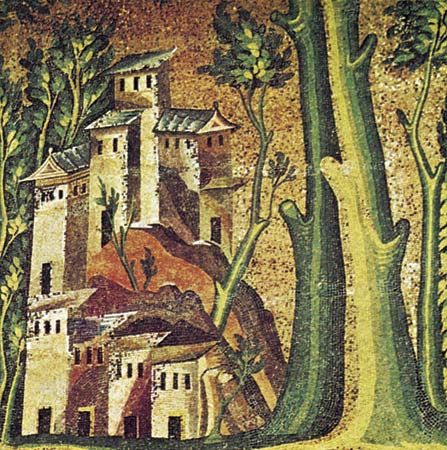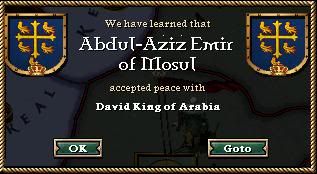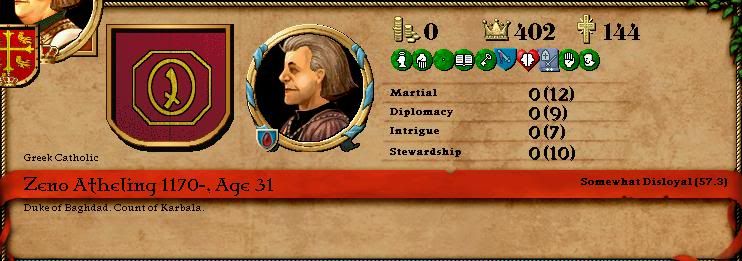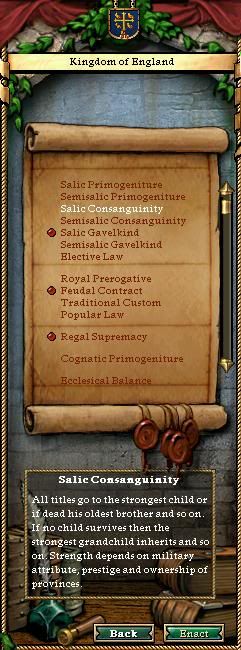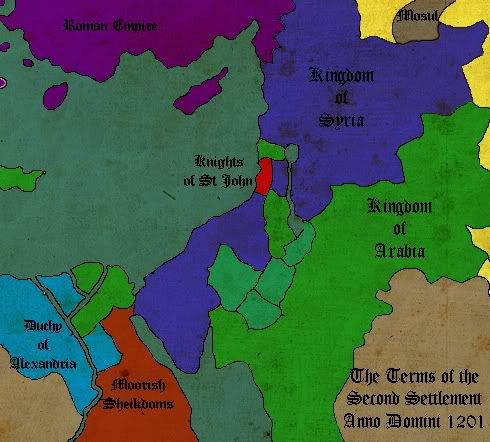Chapter 62 – The Second Settlement – 1201
Chapter 62 – The Second Settlement
Mosaic from the Great Mosque, Damascus, 8th century (?)
1201
From Wilfred of Acre’s Tripartite History
With King John's continued absence from Jerusalem, his poor choice of regent, his brother Basil, became an ever-more-pressing issue. Andronicus of Sinai had already sworn to attend no further sessions of the Jerusalem witangamot, declaring that Prince Basil was not only incompetent, but also unwilling to consult with the witan, as the provisions within the Megalos Cartes demanded. Moreover, the war against the Emir of Mosul had highlighted the discontent among the other members.
The single most powerful duke within the witan was Heraclius of Aleppo, but even he was unable to exert much influence over the regent, who continued to reign in an autocratic manner. Nevertheless, the duke, a loyal friend of the absent King John, was unwilling to resort to arms against Prince Basil, despite the wishes of some of the earls in the witan that he would do so. And so whenever the witan was gathered in Jerusalem, it resolved nothing; hampered as it was by the absence of one of its dukes, and the opposition that existed between the earls and the prince.
This situation may have continued for many years, since King John was disinterested in the affairs in Judea, and Prince Basil was content to rule without the witan’s assistance. Yet the other English Kings were greatly troubled by the confusion in Jerusalem, and were disturbed when, in the course of the recent war, the armies of Jerusalem were disunited and quarrelsome, and contributed little to the struggle against the Emir’s forces.
Therefore they wrote many times to their brother John, and urged him to exert his influence upon the younger Basil, and insist that he resolve his quarrel with the earls in Jerusalem and Egypt. But for some time these pleas went unheaded, as the King was occupied elsewhere. It was not until Eastertide, in the year 1201, that the faraway John acted upon their requests, and agreed that something must be done about the behaviour of their brother Basil. Through their correspondence, they resolved that the only solution was to strip Basil of his powers as regent, and to that end, a Grand Witangamot was called for the feast of Saint Mark the Evangelist, that is, the twenty-fifth day of April of that year.
Both King David and King Romanus attended the Grand Witangamot which was to be held, for the first time, in the city of Damascus, wherein resided King Romanus. A great many of the Dukes, earls and bishops of the land also came. Though King John could not attend in person, he was represented by the aging Patriarch of Jerusalem, Archbishop Stephen, who chaired the session. The meeting was held within the cathedral of St Baldred and St John. This building had once housed the Great Mosque of the infidels, but had been restored to its original purpose by King Saelred, who also chose to honour the memory of his saintly father. The relics of St John the Baptist remain within the shrine, even to this day.
Immediately following the prayers to open the session , the Patriarch rose to his feet, and put to the witan that Prince Basil be stripped of his powers and authority to rule over the Jerusalem Witan in place of his absent brother, the King. The prince, who was himself present in the church, was greatly surprised and angered at this proclamation, and spoke strongly against what he saw as an injust and unnecessary action against him. Yet so thoroughly was he disliked, even by his own bondsmen, the no-one rose to defend him, and the motion to remove him from his position was approved nearly unanimously.
The second question to be put to the Witan was more troublesome. For now that there was no regent in Jerusalem, some replacement had to be found. The only living brother of the three Kings was Zeno, Duke of Baghdad, and he was known to be of unsound mind, having suffered a debilitating illness some years earlier. Men even whispered that he had slain his eldest son.
Moreover, none of the children of the Theodorlings were old enough to assume regnal powers. Bishop Stephan, whom many would have accepted as ruler of the city and as chair of its witan, declined to serve in such a capacity, citing his advancing age and unwillingness to re-engage with temporal matters. Heraclius of Aleppo was desirous of seeing himself as ruler of the City, but the other Kings feared his ambition and military strength. If any man was to be chosen as regent, he must have the authority to contain the ambitions of a man such as Duke Heraclius.
In the face of such a conundrum, it was proposed that the witan in Jerusalem be temporarily suspended, and that the earls would be instead enrolled in the membership of either the Syrian or Arabian gatherings. King John, engrossed as he was in campaigning in England, was content with this solution, as it freed him from responsibilities in Judea. Moreover, many of the earls, tired of the standoff of the past six years, agreed to this arrangement rather than face the possibility of another ineffectual regent.
It was originally agreed that the earls should be allowed to chose for themselves to which witan they wished to belong, but it was soon clear to King David that his younger brother, perhaps due to his victories in the recent war, was much more popular than he. In fact, somewhat to the surprise of everyone, Duke Ølver of Ascalon, who had for many years, following in the footsteps of his father, eschewed the authority of the English Kings, was in attendance at this meeting, and was among the first to pledge his fealty to King Romanus. King David therefore feared for his own position and authority and insisted that, with the exception of those who had already pledged themselves to him, that Romanus accept the loyalty of only those earls who resided north of Galilee. The earls of Egypt and Crete, therefore, entered into the Arabian Witan.
Finally, the Patriarch announced, on behalf of King John, that the eldest of the Theodorlings, being without a son and heir, wished for his successor to be chosen in the traditional manner, from within his extended family by the consent of the grand witan. It was obvious to all that the King intended his conquests in England to be passed on to one of his brothers, and not to fall into the hands of the Normans once more. Yet unwilling to choose between them, and wishing to avoid the tumult of the division of the realm which had happened on the death of their father, King John placed the future choice in the hands of the earls, as had been traditional for the English Kings of Old.
In such a way, the fate of the Jerusalem Witan was decided by words and by compromise. This was much different from the armed struggles that had decided the fate of the realm in the days of King Theodorus, but there were still those who were not happy with the decision, and resorted to violence. Duke Heraclius was once such man. He had secretly harboured the desire to rule in the City of Jerusalem for many years, firstly daring to dream of ascending the throne during the civil strife which had plagued King Theodorus, and more recently as regent for the absent King John. But the settlement agreed upon in Damascus robbed him of this possibility, and in his frustration, he refused to pay homage to either king. Unwilling to allow such disobedience, King Romanus therefore sought his loyalty by force of arms, and laid siege to his many fortresses in northern Syria. Though they were well-provisioned, the King was patient and unmoveable, and the Duke was forced to surrender. Wishing to show clemency, Romanus allowed the Duke to retain many of his estates, and seized as punishment only the city of Hama.
Meantime, Prince Basil, unwilling to accept his loss of status, so soon after he had been lifted from obscurity by King John, refused to allow the agents of King David into Jerusalem, and the King was only able to enter the City after a battle outside its walls with the armsmen of the Prince. Despite this, King David was apt to show mercy on his half-brother, and in exchange for taking his children as hostages, did allow the Prince to continue to govern the city and its environs. Just as the Grand Witan was to be Bishop Stephen’s last great act as Patriarch of Jerusalem, so this also marked a decline in the importance of the City itself, for it was no longer to be the residence of King, nor even of a regent, but only one among many important cities of the English Kingdoms.



